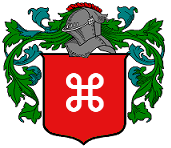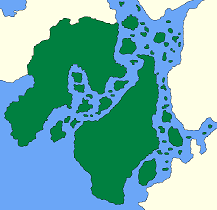Bruxella
| Sovereign Kingdom of Bruxella | |
 |

|
| National flag | Royal Coat of Arms |

| |
| Motto | Si vis pacem, para bellum |
| Capital | Ĉefurbo |
| Languages - Official - Unofficial |
Esperanto English |
| Government - Monarch - Prime Minister |
Unitary monarchy Lucius IX Thomas Carter (BLP) |
| Constitutional Events Kingdom united House of Paladio The Bloody Revolution Re-establishment |
1336 1505 1714 1736 |
| Area - Total - % water |
6,706,987 km² 31.78% |
| Population - Total (2007) |
1,632,140,156 |
| GDP (FY2007/08) - Total (NSD) - GDP/capita (NSD) |
$36,691,837,078,465.21 $22,818.31 |
| National animal - English name |
Aquila bruxali Bruxellan Eagle |
| Currency |
1 Denarius (Ѐ) = 100 As (ª) |
| International abbreviations - Sport - Government |
BRX BRUX |
| Naval craft classification - Military - Civilian |
HSMS BV |
| Internet TLD | .bx |
| Calling code | +279 |
| PDAS rating | C |
The Sovereign Kingdom of Bruxella is a country on the south-western fringes of the region of Haven, bordering the Axacal Sea. It is primarily composed of the island of Arbo and the continental region of Ananaso - the only part of the country with a land border (shared with Questers) - and many hundreds of smaller islands of varying size.
The Sovereign Kingdom is a parliamentary democracy and a constitutional monarchy organised as a unitary state, with the King as Head of State. It currently only has a PDAS rating of 'C' due primarily to the under-developed state of the economy and current lack of international influence. Bruxella has historically chosen to limit its involvement in external affairs - although foreign travel is a popular amongst citizens, successive governments have shied away from supranational alliances or trade pacts. With the recent land-slide election of the Bruxellan Labour Party under its new, centre-orientated leadership, this process has begun to be reversed.
